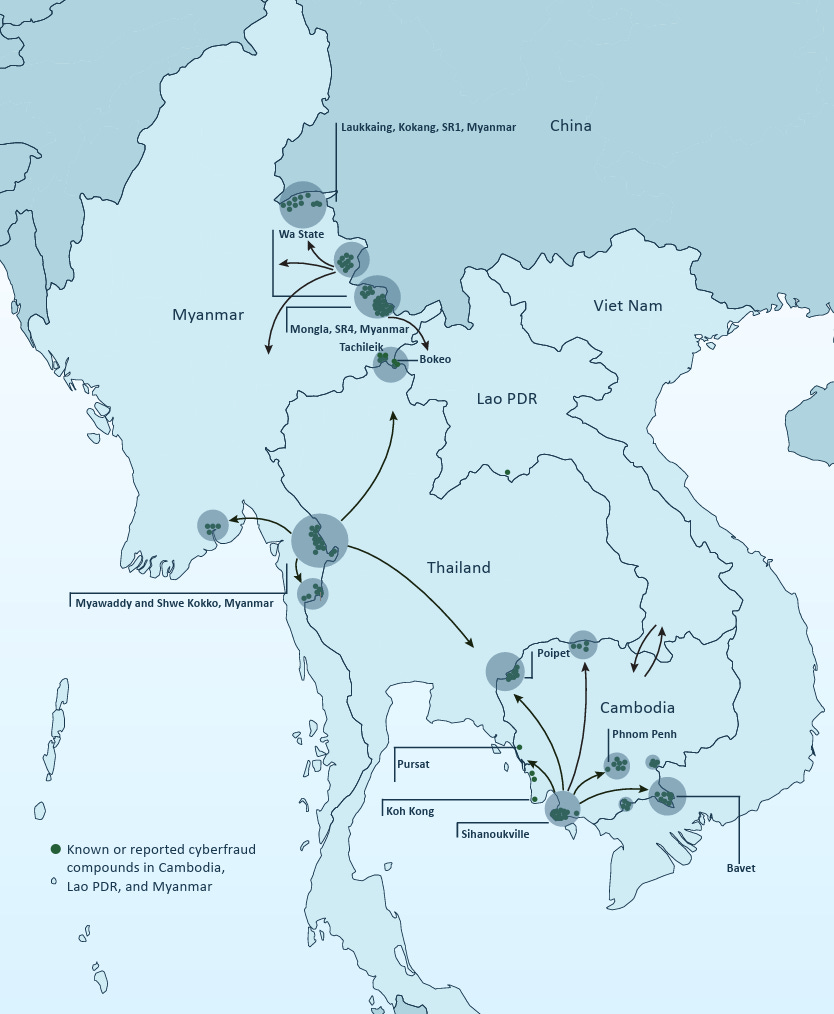Enslaved in the Cyber Age: Trapped Inside Southeast Asia's Scam Compounds
The internet promised prosperity. In Southeast Asia, it’s delivered cyber-slavery — fueling a vast scam industry in Myanmar’s borderlands - and beyond
This isn’t how it was supposed to be
The internet was meant to democratize opportunity - to connect the disconnected, deliver the gift of distance learning, empower small entrepreneurs, and lift communities out of poverty. In Digital Pandemic: How Tech Went From Bad to Good, I documented how during the Covid-19 pandemic millions in Asia were liberated from the so-called digital divide when connectivity came their way.
But in parts of Southeast Asia, it’s doing the opposite.
In Myanmar’s eastern borderlands, sprawling scam compounds are thriving. Even after a February crackdown, construction has continued - proof that criminal networks have not only survived but adapted. Nikkei’s analysis of satellite imagery and eyewitness testimony reveals a system so entrenched it now resembles a parallel economy: one that traffics people as ruthlessly as it defrauds victims.
Many of these operations trace their origins to Chinese-backed casino developments that pivoted to online fraud during - guess when? During the Covid-19 pandemic. The result: an estimated $37 billion in global losses last year alone. Workers - many lured from South and East Asia (even citizens from war-torn Ukraine have been found to be working in regional scam centers, according to the UN) - are beaten, confined, and forced to scam victims under the threat of torture.
The civil war following Myanmar’s 2021 coup has only deepened the problem, leaving criminal syndicates to operate with impunity in regions where local militias, not the state, hold power.
Says the United Nations Office on Drugs and Crime: “Many (industrial scale cyber-enabled fraud and scam centres) are physically relocating and converging around inaccessible and autonomous non-state armed group-controlled territories, Special Economic Zones (SEZs), and other vulnerable border areas across the region, especially in the Mekong, which have served as breeding grounds for criminal networks.”
Neighboring Thailand is calling for cross-border cooperation to tackle cybercrime and human trafficking, but so far, coordination is weak. One source told me that Thailand only started to take the problem seriously when it impacted tourism from China. Indeed, ahead of the busy 2025 Lunar New Year travel period and before she was forced from office, former Thai Prime Minister Paetongtarn Shinawatra recorded an ad dubbed in Chinese to calm fears among Chinese nationals that they may fall victims to scams and trafficking while visiting the kingdom. It was posted after Chinese actor Wang Xing went missing near the Thai-Myanmar border, with authorities suspecting human trafficking by criminal groups.
Failure by governments in the region to address the problem, says the UN, “will have unprecedented and potentially irreversible consequences for Southeast Asia that will be felt globally for years to come.”
The digital age promised liberation and upward mobility. In Myanmar’s (and now spreading to other neighboring jurisdictions) shadow economy, it has delivered enslavement — a chilling reminder that technology without governance can just as easily become a weapon as a tool for progress.
The number of scam centers in eastern Myanmar is rapidly expanding. Even after a large-scale crackdown in February, construction has continued -- underscoring that criminal hubs have not been eradicated. Nikkei analyzed satellite imagery and eyewitness testimony to reveal the scale and persistence of the crisis. “Inside, that one is like a prison.”
In the second half of the 2010s, Chinese-backed companies began developing casino complexes in the region. When the COVID-19 pandemic disrupted the casino industry, many of these facilities were converted into hubs for online fraud.
According to United Nations estimates, losses from scam centers in 2023 reached up to $37 billion in East and Southeast Asia alone.
After the 2021 military coup, Myanmar’s civil war intensified, leaving the central government unable to maintain effective control over the Myawaddy region. In many areas, armed groups of ethnic minorities have established de facto authority.
“Criminal networks amassed such enormous profits that they were able to sustain -- and even expand -- these sprawling compounds. One man who claimed to have perpetrated scams recalled that a deep, resonant beat from a Chinese-style drum would echo through the compound each time a deposit of over $100,000 was received” - Nikkei
A man from South Asia who says he was held for six months at KK Park -- one of the largest scam centers -- recounts his experience. He was forced to engage in romance scams, tricking victims into paying money by making them believe they were in a romantic relationship. He lived with seven others in a cramped room and worked 16 hours a day.
Violence was commonplace. According to the South Asian man’s testimony, a supervisor struck him with a boot. He said another worker was dragged to a torture room and beaten so severely he could no longer stand.
Other criminal compounds have emerged along the Myanmar-Thailand border. By cross-referencing satellite photos with official records and interviewing experts, Nikkei identified suspected scam bases in and around Myawaddy, Kayin state.
According to numerous reports, large numbers of foreign nationals are trafficked into these compounds and forced to perpetrate scams.
Japan has been affected. In February 2025, a Japanese high school student believed to have been held captive in Myanmar was rescued and later arrested on fraud charges.
According to Myanmar’s military government, from October 2023 to June 2025, authorities deported more than 66,000 foreign nationals who had stayed in the country illegally to participate in fraud or gambling.
Thai Prime Minister Anutin Charnvirakul said recently there’s a need to combat cross-border cybercrime. At the recently-concluded APEC Summit, he said: “Thailand stresses the urgency of addressing cybercrime, particularly online scams and human trafficking - cross-border threats that require concerted regional action.” He said what’s required is information-sharing, harmonized law enforcement and and raising public awareness - Bangkok Post

At Bangkok Forum, Reuters Foundation Chief Warns: Journalism Faces Four Existential Threats
BANGKOK — The future of journalism looks increasingly precarious, warned Yasir Khan, Editor-in-Chief of the Thomson Reuters Foundation, in a keynote address at the Foreign Correspondents’ Club of Thailand (FCCT).
Speaking to the International Civil Society Week, Khan outlined four major threats confronting journalists worldwide: physical violence, financial strain, legal and digital attacks, and an industry-wide failure to evolve.
Khan said physical assaults on journalists are rising sharply — including targeted, state-sponsored killings. “In the United States alone, there have been more than 100 assaults on journalists this year,” he noted, adding that freelance reporters are among the most vulnerable. He also pointed to legal and digital threats — from hacking and doxing to defamation lawsuits — as tools increasingly used to intimidate and silence journalists.
Perhaps his most provocative message, however, was aimed at traditional or legacy media organizations. “Legacy media has failed to evolve,” Khan said. “We haven’t changed how we make television in decades. Meanwhile, influencers and streamers are connecting directly with audiences. They know their followers — and if we don’t evolve, we die.”
Khan predicted that 2026 could see a wave of media outlets perish unless the industry adapts to new realities and redefines its relationship with audiences.
European negotiators were personally targeted by their American counterparts during a brutal negotiation over green shipping rules, European Commission officials told POLITICO — a highly unusual gambit that left diplomats shaken after the meeting. The threats were made last month, as the U.S. maneuvered to block a new effort to tax pollution at a meeting of the International Maritime Organization in London. “Our negotiators had never seen this before in any international talks,” said one European official, who had spoken to negotiators. “People being summoned to the U.S. Embassy in London — intimidation, threats of cessation of business, threats of family members losing visas.” Another European Commission official added that diplomats returned home rattled after the meetings: “We had feedback from a number of people involved in the negotiations about the pressure they faced.” Since Donald Trump’s return to office, the administration has sought to undermine global climate policy and promote U.S. fossil fuel interests. The president has called efforts to combat global warming a “con job.” He was particularly enraged about the maritime emissions effort, saying it would hit American shippers with unwarranted taxes. The U.S. strategy was laid out publicly ahead of the meeting, with a press release signed by the U.S. secretaries of state, transportation and energy. On top of threats of tariffs, port fees and visa restrictions on crews, the U.S. said it would also look at “sanctions on officials sponsoring activist-driven climate policies.” - Politico
A new CNN poll shows Trump’s approval rating stands at 37% - the worst of his second term in CNN polling and roughly equivalent to his 36% approval rating at this point in his first term. Americans are also broadly unhappy with the state of the country, with 68% saying things are going badly. Dissatisfaction is even higher with the economy, with 72% rating it in poor shape — and 47% naming the economy and the cost of living as the top issues facing the US.
Politicians in Germany and Poland — home to the biggest Ukrainian refugee populations within the European Union — are threatening to yank back the welcome mat amid a sharp increase in the number of young Ukrainian men entering their countries in recent weeks after Kyiv loosened exit rules. While sentiment within both countries is generally favorable toward Ukrainians, their growing presence is increasingly becoming a flashpoint wielded by far-right parties. With Russia’s full-scale invasion of Ukraine going into its fourth winter, the debate is expected to intensify as millions risk being left without heating, water or electricity in the coming months due to ongoing attacks by the Kremlin. In Germany, members of Chancellor Friedrich Merz’s governing conservatives are warning that while the country will continue taking in Ukrainian refugees, public support for the Ukrainian cause could wane if young male emigrants are seen to be avoiding military service. “We have no interest in young Ukrainian men spending their time in Germany instead of defending their country,” Jürgen Hardt, a senior foreign policy lawmaker from Merz’s conservatives, told POLITICO on Tuesday. “Ukraine makes its own decisions, but the recent change in the law has led to a trend of emigration that we must address.” Poland’s far-right Confederation party went further, saying in a statement: “Poland cannot continue to be a refuge for thousands of men who should be defending their own country, while burdening Polish taxpayers with the costs of their desertion.” Ukrainian arrivals in both countries have increased significantly following the relaxation of Ukrainian exit rules over the summer — a move that ironically was intended to alleviate military recruitment issues by making it easier for young men to come and go. Nearly 45,300 Ukrainian men between 18 and 22 years of age crossed the border to Poland from the beginning of 2025 until the loosening of exit restrictions at the end of August, according to numbers the Polish border guard sent to POLITICO. In the next two months that number soared to 98,500, or 1,600 per day. And many of the newcomers appear to have kept moving west: The number of young Ukrainian men aged 18 to 22 entering Germany rose from 19 per week in mid-August to between 1,400 and 1,800 per week in October, according to German media reports citing numbers from the German interior ministry. Ukrainian President Volodymyr Zelenskyy loosened the exit rules for men who aren’t yet eligible for military service, which begins at 25, at the end of August. Previously, men between the ages of 18 and 60 weren’t allowed to leave the country; under the new regulations, men aged between 18 and 22 can leave and return without risking prosecution.
US President Donald Trump indicated again he is not considering providing Tomahawk missiles to Kyiv -- which has pleaded for the long-range weapon it says is crucial to striking back against Russia as the Kremlin intensifies air strikes on Ukrainian cities. Asked by a reporter aboard Air Force One on November 2 if he was considering providing the sophisticated cruise missiles to Ukraine, Trump said: “No, not really,” although he later added he could still change his mind.
Trump has at times suggested the United States could provide Tomahawks to Ukraine, although he has more recently appeared to oppose the idea. His latest response could further serve to dampen hopes in Kyiv of receiving them - RFE/RL
Interpol has rejected a request from Kyrgyz authorities to issue an international warrant for the co-founder of one of the country’s leading independent media outlets, calling the request politically motivated. OCCRP learned Thursday that Kyrgyzstan had asked Interpol to issue a so-called Red Notice for Rinat Tuhvatshin, the co-founder of Kloop, an award-winning outlet that is part of of OCCRP’s global network. A Red Notice requires authorities in member countries to arrest the wanted person for possible extradition. An Interpol spokesperson said on Friday that the request from Kyrgyzstan had been received, but rejected. “Interpol’s constitution has strict rules preventing our system from being used for political purposes, and so we have declined the Red Notice request,” said Samuel Heath, Interpol’s director of communications. Still, the Red Notice for Tuhvatshin was visible to authorities in at least one country on Thursday and appeared as “pending review” in another country’s system. Heath declined to comment on how or why the Red Notice was disseminated despite having been rejected. The move against Tuhvatshin comes amid a years-long crackdown on independent journalism under President Sadyr Japarov, who took office in 2020. Kloop has published investigations into corruption at the Kyrgyz border and irregularities during the 2021 presidential election, among other topics. Unhappy with such reporting, the government sued the outlet and a Bishkek court ordered its closure in February 2024, arguing that its coverage of corruption and other irregularities “affected people’s mental health” by upsetting them with “negative information.”







